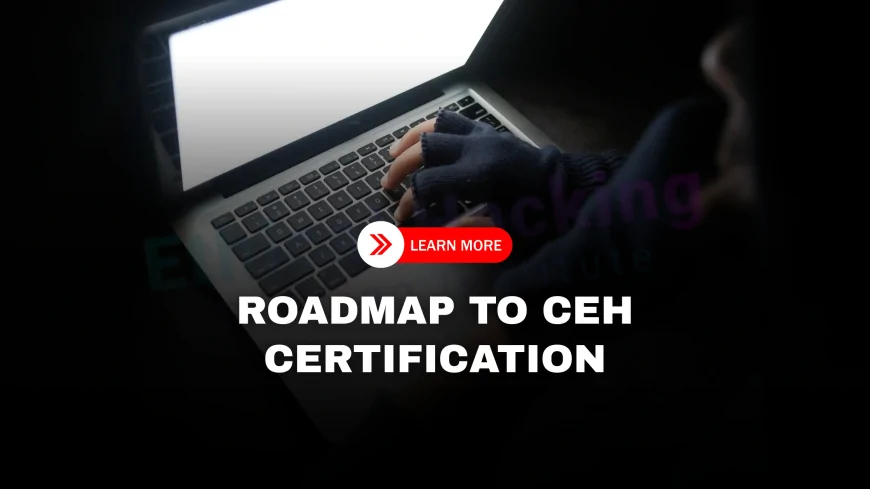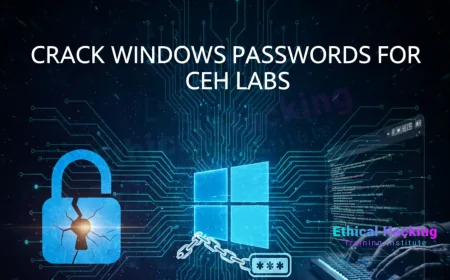CEH Training Course: A Step-by-Step Guide to Becoming a Certified Ethical Hacker | Certified Ethical Hacker Training: Your Step-by-Step Roadmap to CEH Success
Learn how to become a Certified Ethical Hacker with this step-by-step CEH training course guide. Explore CEH v13 structure, training options, benefits, and career paths in cybersecurity.

Table of Contents
- Introduction
- What is the CEH Certification?
- Who is Eligible for CEH?
- Step 1: Understand the CEH v13 Structure
- Step 2: Choose a CEH Training Mode
- Step 3: Enroll with an Accredited Partner
- Step 4: Practice in Real-World Labs
- Step 5: Prepare for the CEH Exam
- Step 6: Attempt the CEH Exam
- Step 7: Consider CEH Practical
- Career Opportunities After CEH
- Benefits of Becoming a CEH
- Cost and ROI of CEH Training
- Renewing and Maintaining Certification
- FAQs
- Conclusion
Introduction
The Certified Ethical Hacker (CEH) certification is one of the most prestigious and globally recognized credentials in the cybersecurity industry. Administered by the EC-Council, CEH demonstrates that a candidate has a solid understanding of how to identify, analyze, and exploit vulnerabilities in systems—ethically.
What is the CEH Certification?
The CEH (Certified Ethical Hacker) certification, offered by the EC-Council, is a globally recognized credential that validates a professional’s ability to think and act like a hacker—ethically. It certifies individuals in the skills of identifying vulnerabilities, assessing risks, and preventing cyberattacks using the same tools and techniques as malicious hackers, but in a lawful and controlled environment.
Key Highlights of CEH:
-
Full Name: Certified Ethical Hacker
-
Provider: EC-Council (International Council of E-Commerce Consultants)
-
Current Version (2025): CEH v13
-
Exam Code: 312-50 (CEH MCQ)
-
Exam Format: 125 questions, 4 hours, multiple-choice
-
Level: Intermediate (after foundational cybersecurity knowledge)
What CEH Covers:
-
Footprinting and reconnaissance
-
System hacking and malware analysis
-
Web app and SQL injection attacks
-
Cloud and IoT security
-
Cryptography and wireless attacks
-
Vulnerability scanning and penetration testing
-
Social engineering and phishing techniques
Who Should Take It?
-
Aspiring ethical hackers
-
Penetration testers
-
Cybersecurity analysts
-
IT professionals aiming to shift into offensive security
Why It’s Valuable:
-
CEH is approved under DoD 8570/8140 for U.S. government roles
-
Recognized by top employers across the globe
-
Acts as a stepping stone toward advanced certs like CEH Practical, CPENT, or OSCP
-
Enhances your credibility and demonstrates hands-on hacking knowledge
Who is Eligible for CEH?
Anyone with two years of IT security experience or who completes official EC-Council training is eligible. Freshers may also apply through an accredited CEH training partner without prior experience.
Step 1: Understand the CEH v13 Structure
CEH v13 consists of:
- 150 multiple choice questions
- Duration: 4 hours
- Topics: Footprinting, Malware, Vulnerability Analysis, Web App Hacking, Cloud & IoT Security
Step 2: Choose a CEH Training Mode
You can choose from:
- Instructor-led classroom training
- Online live training
- Self-paced eLearning
- Corporate team training
Step 3: Enroll with an Accredited Partner
Training through an EC-Council Accredited Training Center (ATC) ensures you receive:
- Official courseware
- Lab access (iLabs)
- CEH exam voucher
Step 4: Practice in Real-World Labs
CEH labs simulate enterprise environments with real operating systems, networks, and applications. You’ll use tools like Nmap, Metasploit, Wireshark, Burp Suite, and more.
Step 5: Prepare for the CEH Exam
Use EC-Council's official iLearn, exam simulators, practice tests, and group discussions. Cover each domain and test your readiness with mock exams.
Step 6: Attempt the CEH Exam
Take the CEH exam at a Pearson VUE center or via EC-Council’s remote proctoring. Passing score typically ranges between 60% to 85%, depending on the test form.
Step 7: Consider CEH Practical
After passing CEH MCQ, you can elevate your credential by attempting CEH Practical. It’s a 6-hour, hands-on lab exam where you’ll work on real-world attack scenarios.
Career Opportunities After CEH
- Ethical Hacker
- Penetration Tester
- Cybersecurity Analyst
- Security Consultant
- Network Security Engineer
Benefits of Becoming a CEH
- Global recognition in cybersecurity field
- Higher salary packages (₹6 LPA to ₹18 LPA+ in India)
- Eligible for government, defense, and MNC cybersecurity roles
- Hands-on skills validated through real attack simulations
Cost and ROI of CEH Training
- CEH Training + Exam Voucher: ₹45,000 – ₹65,000 in India
- CEH Practical (Optional): ₹12,000 – ₹15,000
- ROI: High, due to career growth and global demand
Renewing and Maintaining Certification
CEH certification is valid for 3 years. To renew, earn 120 EC-Council Continuing Education (ECE) credits by attending webinars, writing blogs, taking advanced certifications, or teaching cybersecurity courses.
Frequently Asked Questions (FAQs)
1. What is CEH certification?
CEH is an ethical hacking certification from EC-Council that validates penetration testing and cybersecurity skills.
2. Is CEH globally recognized?
Yes, CEH is recognized worldwide and approved under U.S. DoD 8570/8140.
3. What is CEH v13?
It’s the latest version with updated modules on AI, IoT, cloud security, and modern hacking tools.
4. Can a beginner take the CEH course?
Yes, especially if they enroll with an accredited training provider offering structured guidance.
5. Is CEH enough to get a job?
CEH adds great value but combining it with hands-on experience increases job prospects.
6. What is CEH Practical?
A 6-hour hands-on lab exam that proves your practical skills in a simulated hacking environment.
7. How long does CEH training take?
Typically 30–60 hours, depending on the mode of learning.
8. Is CEH better than CompTIA Security+?
They serve different purposes; CEH focuses on ethical hacking while Security+ covers broader security concepts.
9. How much does CEH cost?
Training + exam costs between ₹45,000 to ₹65,000 in India.
10. How can I renew CEH?
Earn 120 ECE credits in 3 years or retake the exam.
11. Is CEH difficult to pass?
With proper training and practice, most candidates pass the exam confidently.
12. Do I need coding skills for CEH?
Basic scripting knowledge is helpful but not mandatory.
13. Does CEH include cloud and IoT hacking?
Yes, CEH v13 includes modules on cloud and IoT vulnerabilities.
14. Which companies hire CEH professionals?
Government agencies, MNCs, and cybersecurity firms like IBM, Deloitte, Infosys, and Accenture.
15. Is CEH theory-based?
The MCQ exam is theoretical, but the CEH Practical exam tests real-world hacking skills.
16. Can CEH be done online?
Yes, CEH training and certification are available 100% online.
17. What is the pass mark for CEH?
It ranges between 60% and 85%, depending on the exam set.
18. Is CEH suitable for freshers?
Yes, many freshers start with CEH to enter the cybersecurity field.
19. What’s after CEH?
Advanced certifications like CPENT, OSCP, and LPT Master are great next steps.
20. How often is CEH updated?
Usually every 2–3 years to reflect the latest cybersecurity trends and threats.
Conclusion
Becoming a Certified Ethical Hacker through a structured CEH training course offers credibility, skills, and confidence to pursue a rewarding cybersecurity career. Follow the step-by-step process, practice with dedication, and utilize the latest resources to ace your CEH certification.
What's Your Reaction?
 Like
0
Like
0
 Dislike
0
Dislike
0
 Love
0
Love
0
 Funny
0
Funny
0
 Angry
0
Angry
0
 Sad
0
Sad
0
 Wow
0
Wow
0


















